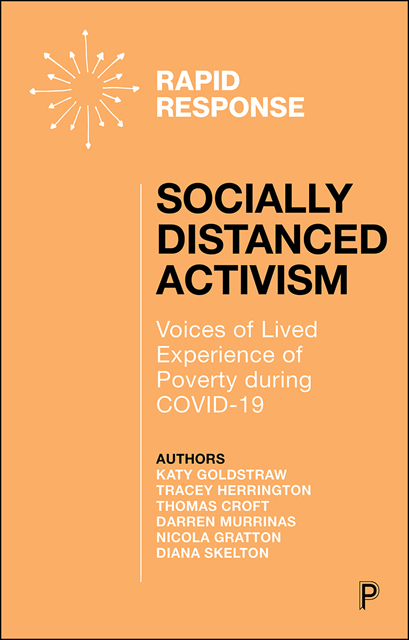Book contents
- Frontmatter
- Dedication
- Contents
- Acknowledgements
- Introduction: our voice means something
- 1 “Why aren’t we heard with our voices?” APLE Collective’s lived experience of poverty
- 2 APLE Collective and pandemic activism
- 3 Thriving women
- 4 ATD Fourth World: overcoming epistemic injustice globally
- 5 Finding a place in a disconnected world: Expert Citizens and Keep Talking
- 6 Conclusion: power, voice and change
- Notes
- References
4 - ATD Fourth World: overcoming epistemic injustice globally
Published online by Cambridge University Press: 14 April 2023
- Frontmatter
- Dedication
- Contents
- Acknowledgements
- Introduction: our voice means something
- 1 “Why aren’t we heard with our voices?” APLE Collective’s lived experience of poverty
- 2 APLE Collective and pandemic activism
- 3 Thriving women
- 4 ATD Fourth World: overcoming epistemic injustice globally
- 5 Finding a place in a disconnected world: Expert Citizens and Keep Talking
- 6 Conclusion: power, voice and change
- Notes
- References
Summary
During the pandemic, members of ATD Fourth World living in poverty communicated across the world to build a picture of their experiences. This chapter will first explore that international work. It will then give examples of how ATD translates ideas into activism to effect change. One example comes from an indigenous American community where people in poverty are at the forefront of strengthening and broadening the existing web of solidarity. Another example tells the story of participatory research about the impact of COVID-19 on UK family courts, where hearings are being carried out via telephone and videoconference. Finally, this chapter will identify ways that ATD’s approach creates conditions for people in poverty to develop their knowledge and challenges the interpretive barriers that create epistemic injustice.
Activism on the ground
Working in 34 countries on five continents, ATD is neither a top-down hierarchy nor a bottom-up federation. Our horizontal governance is tethered to the realities of people in the worst poverty. Through a collective learning process, our members regularly engage together through broad and focused dialogues that mix experiences at local and international levels. This process begins with activists struggling to overcome poverty in their own lives and to support their neighbours. Next, we build respectful connections among activists, academics, policy makers and professionals working in low-income communities. This intense collaborative work develops constructive conversations (Skelton et al, 2016a, 2016b).
The current International Leadership Team (ILT) of ATD will complete its term in October 2021. In April–October 2020, ATD carried out a worldwide consultation of our members to prepare for this transition. The goals of this consultation were: (1) to take stock of the realities and hopes of people in deep poverty; (2) to think together about the biggest challenges society faces; and (3) to select 23 people for a nominating committee to choose the next ILT.
Despite the unprecedented social distancing constraints imposed by the pandemic, ATD (founded in 1957) could draw on its long history to create the conditions for this consultation. Our principles of horizontal governance include:
• listening first to those who face the greatest challenges;
• valuing the contributions of people in poverty and supporting their freedom of expression;
• an ethos of mutual respect that includes unlearning prejudice and preconceptions in order to cultivate reciprocal intercultural learning and fellowship;
- Type
- Chapter
- Information
- Socially Distanced ActivismVoices of Lived Experience of Poverty During COVID-19, pp. 71 - 92Publisher: Bristol University PressFirst published in: 2023



